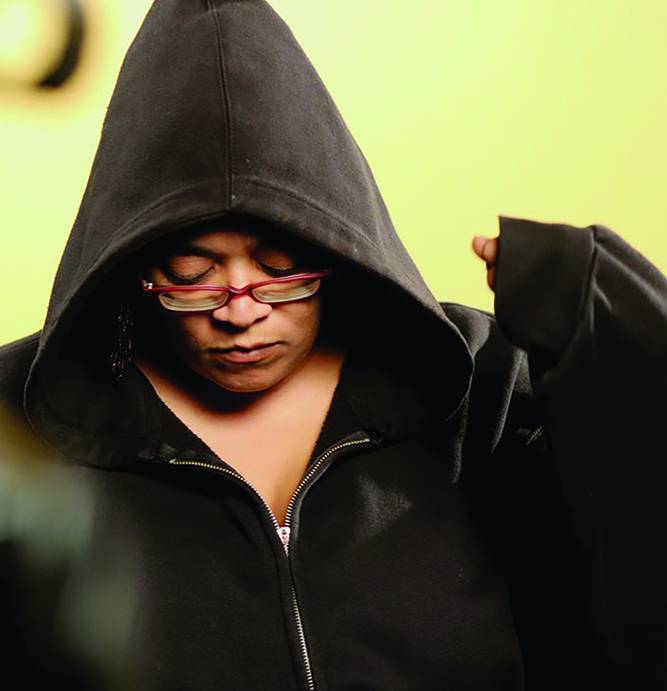COVID-19 has been especially painful for those who love live performance. Theatres closed right in the middle of one of the art form’s most exciting periods: a time when immersive theatre, multimedia, and spoken word are changing the nature of public storytelling; when conventions around criticism and authorship are being questioned; when the stage has become newly receptive to voices long suppressed by the mainstream.
But as Donna-Michelle St. Bernard will tell you, theatre never really stopped – and neither has she.
Over the past year, the highly energetic playwright, director, dramaturge, arts administrator, and hip-hop artist has been busier than ever: “Rolling with the punches is my number one skill,” she laughs.
Among other things, she ran an internet-based performance course, created a recently produced “curbside opera” for Toronto’s Tapestry Theatre, and continued work on the 54ology – a long-term play series featuring one play set in each African country. When asked about how she juggles her many projects, she says: “A lot of the writing process is about waiting or gestating. There might be a flurry of activity around one story, while another might need to sit for a minute. But while it sits, I don’t need to.”
"As a writer you're the only one in the water, and you have to swim to where you're going. But I can see where you're going - I can shine a light on it. And you can use that light to see where you need to go."
She’ll sit very happily, however, with the many students who will be seeking her feedback this year as UC’s 2021-2022 Barker Fairley Distinguished Visitor. In this role, St. Bernard offers critiques of performance-based or other creative writing work and answers questions about the creative life and process.
St. Bernard thinks it’s most important to honour the intentions of emerging writers who seek her advice.
“I don’t know more about the writer’s story than the writer does,” she says. “There’s a whole bunch of the story that they didn’t write down, and I may not know the part their heart is really beating for. I only know what I’m responding to, so it’s important to know that I’m not the centre of the universe.”
She likes an analogy favoured by her fellow playwright, Nina Lee Aquino: “Nina talks about being a lighthouse keeper. As a writer you’re the only one in the water, and you have to swim to where you’re going. But I can see where you’re going – I can shine a light on it. And you can use that light to see where you need to go.”
Helping writers to find their particular voice is central to St. Bernard’s mission as an artist. She found hers while studying English literature at U of T at the same time that she was performing sketch comedy and developing her hip-hop alter ego, Belladonna the Blest.
Born on the small Caribbean island of Bequia, St. Bernard was attracted to words from an early age – writing stories about mermaids, unicorns, and robots. Much later, social justice became her passion: “Accountability is a huge driver for me,” she says. In 2005, this led her to found New Harlem Productions, a company dedicated to intercultural, interdisciplinary work.
St. Bernard’s political and social concerns have been most prominently explored in the 54ology series. To date, she and her collaborators are “about halfway through” the gargantuan project, having produced stories from all over the African continent. Among these are the multi-award-winning Gas Girls, inspired by sex trade workers at truck stops in Zimbabwe; and the Governor General’s Award-nominated A Man A Fish, about external forces impacting Burundi’s fishing trade.

Next year, St. Bernard will premiere The First Stone at Toronto’s Buddies in Bad Times Theatre. The play explores the situation of child abductees in the Ugandan civil war. “It will have the biggest cast so far, and has had the longest development track,” she says. “It’s all-consuming, and it’s very exciting to finally be getting there.” In May, she co-hosted a community justice forum while workshopping the play. Given that the play deals with stolen children taken from their communities, The First Stone resonates thematically with the residential school tragedy in Canada – a subject that was also explored, via discussion and film, in the forum.
St. Bernard says she is most motivated by collaborative work, which constantly means trying to understand perspectives outside her own. As general manager of Toronto’s Native Earth Performing Arts, for example, she helped hundreds of Indigenous artists to develop their work, and her performance piece, Sound of the Beast, incorporated a strong ASL (American Sign Language) component, as performed by Deaf artist Tamyka Bullen.
In a discussion on queer theatre and performance at U of T’s Bonham Centre several years ago, St. Bernard said: “My practice of art is focused on making space where there is resistance, occupying space, broadening the space, and offering it to other people, to other voices. ... If you feel that you’ve started outside of the brackets and worked your way in, do not get comfortable. Never get comfortable.”
That’s why she constantly pushes herself toward new forms and varieties of collaboration and toward stories that, while not necessarily new, have not yet been widely told. She recognizes that it’s not always easy.
“I have been the beneficiary of so much generosity from senior artists and administrators,” she says. “In my lifetime, some of the best learning I’ve had is actually from someone saying, ‘That’s not how you do that,’ and then being receptive to furthering that conversation. I’d always like to do everything better, actually.”
It’s that groundbreaking feeling of discomfort that she seeks to impart to students this year – a feeling that, while initially difficult, can ultimately lead to the very best and most transformative kind of art. Perhaps another line from one of her many speeches says it best: “Let’s just do it, you guys. Let’s be bold.”
Photos by Graham Isador
